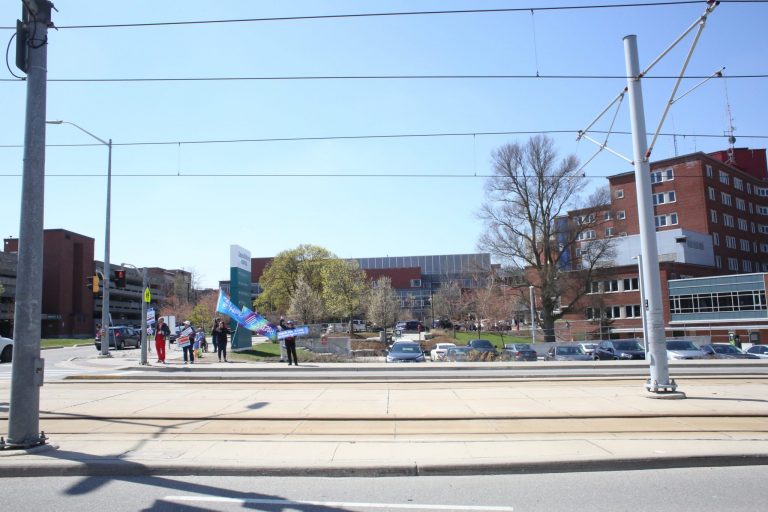On Apr. 27, at Grand River Hospital, there was a rally held against the privatization of healthcare and was hosted by the Waterloo chapter of the Ontario Public Service Employees Union (OPSEU). Healthcare providers, patients, advocates and all others who depend on public healthcare were in attendance.
“It’s going to put staff under adverse and stressful working conditions, it will leave us more prone to burnout and sick calls. It spreads us way too thin,” Dan Hahn, VP of OPSEU, said.
Waterloo Public Square was the home of the Protest to Protect Public Hospitals in the winter of last year. This protest included a march to the Grand River Hospital in Kitchener, across from CTV News.
OSPEU members brought signs and messages encouraging Premier Ford to take urgent action towards restoring and rebuilding hospital services.
Jim Stewart is Chair of the Waterloo Region Health Coalition and attended the protest.
“The reason we’re having this province wide referendum is because nobody was asked during the last election if they were in favor of privatizing our public health care system. And we believe that that is unconscionable by the Ford administration and can’t go unchallenged,” Stewart said.
OPSEU Local 57 is a composite local representing over 655 full-time and part-time and casual members working for the Family and Children’s Services of the Regional Municipality of Waterloo, KidsAbility and Monica Place.
“We can let the government know that this is not something that the people of Ontario want. And all the rallies that are happening across the province today that in different cities, we’re all trying to bring that same message across that this is public health care,” Kaye Freeman said.
OPSEU works towards building solidarity among members and providing a safe working environment for all.
“Our public hospitals are going to be devastated because of the transfer of all the wealth that goes on. I call the finances that go along to keep our hospitals operating and the fact that all the people, the human resources will be also transferred to these private clinics,” Stewart said.
Province-wide, Health Coalitions have launched a major fightback to stop the privatization of public hospitals. From May 26 to 27, a referendum will be held by the Ontario Health Coalition. More than one thousand voting stations will be open across Ontario.
“We’re having a variety of protests against Bill 60, which is the health act that Mr. Ford has just put forward. And this is really the privatization of many of the majority of our services that are delivered in our public hospitals. And they’re going to be moved over to profit driven private clinics,” Stewart said.
Bill 60, proposed Feb, 2022, would allow more private clinics to open and conduct OHIP-covered surgeries and diagnostic services. The Ford government has called for bids by three new, private day hospitals to do 14,000 cataract surgeries.
Ford’s government announced that it is moving forward with plans to expand privatization of surgeries and diagnostics.
“It’s no longer a compassionate system. It’s a system that’s driven by profit. And we don’t want that,” Stewart said.
Many public hospitals in Ontario have operating rooms that shut down at 4 p.m. and on weekends due to lack of funding and staffing.
Organizations like the OPSEU call for the government to support local public hospitals that have the lowest finding in Canada.
“We just want to support our public health care and as having private clinics, I don’t believe is going to reduce health wait times,” Judy Kaye Freeman, president of OPSEU Local 236, said.
According to the 2020-21 Interprovincial Comparison done by Financial Accountability Office of Ontario, province has consistently ranked the lowest in the country for how much it spends on healthcare.
Health spending per capita in Ontario was $4,800 per person in 2020, which was the lowest in Canada and $536 below the average spent by other provinces.
“Reports have come out even back in November of last year that this government had underfunded health care by over $800 million and the government made decisions policy legislature that prevented that money from coming back to the people of Ontario,” Kaye Freeman said.
Patients’ province-wide have reported increased charges for their needed healthcare. This includes access to doctors, tests and surgeries.
“Our region donates money to our hospitals to provide diagnostic tests and machinery for the hospitals. Our people volunteer our time to come and be volunteers in the hospitals. And it’s really our health care. It’s not the government’s,” Kaye Freeman said.
In 2020, program spending per capita was $11,794, the lowest among the provinces was $1,960 which was lower than the rest of Canada’s average, $13,754. Ontario’s relatively low level of spending includes the below average health and “other” program spending and its above average spending on education.
For more info on the referendum .

